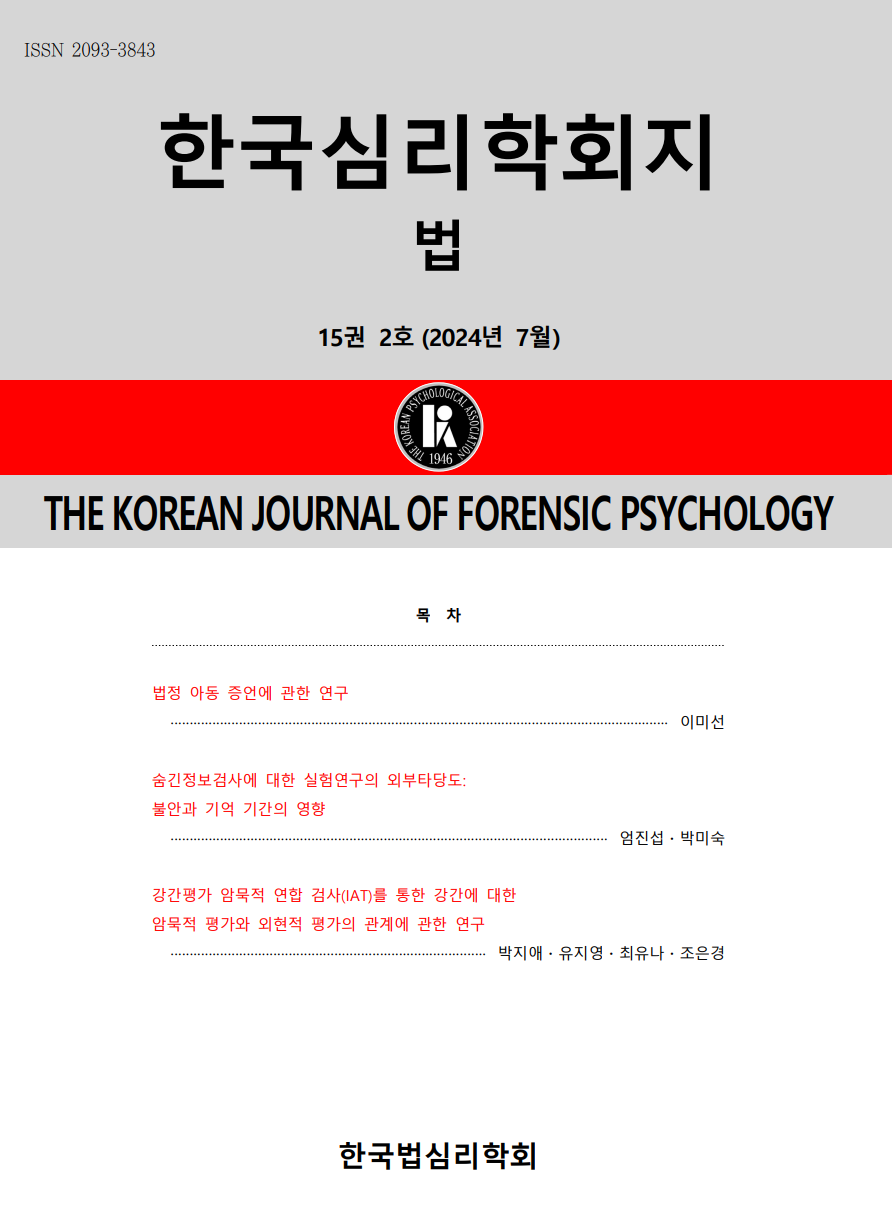 ISSN : 2093-3843
ISSN : 2093-3843
This study compared the procedure of statement analysis and the present state of its utilization in Korea with those in three Western Europe countries, Germany, Sweden, and Swiss. In order to investigate the specific procedure of statement analysis and the different state of the utilization in each country, literature was reviewed and in-depth interview was conducted with each country’s experts who have been currently working in both practical/academic field of statement analysis. Generally, in the Western Europe countries, the courts have expert lists and the experts would be requested to conduct statement analysis of a witness by the court or a party of the trial. In Korea, statement analysis could be conducted in any stage of criminal procedure. In Germany and Sweden, an expert’s testimony based on his/her statement analysis for a witness is admissible to the courts, which is the most distinctive feature in comparison to the statement analysis expert’s testimony in Swiss and Korea. An expert’s opinion is regarded as only one piece of information for criminal investigation or trial. German and Swiss courts have the minimum standards for admissible expert’s report. In Sweden, there is a scientific assessment tool, Structured Quality assessment of eXpert witness testimony (SQX-12) that would allow triers of fact to assess the quality of expert report, while no such instrument or standard have developed in Korea. On the basis of the comparison, the four ways to improve the procedural validity and the utilization of statement analysis in Korea were suggested. As these suggestions would effectively strengthen the procedural validity of statement analysis and expand the utilizability of its result in Korea, it ought to be considered as significant information in the future policy making.
박상기 (2016). 성범죄 피해아동의 진술의 신빙성 판단 기준-독일법원판결을 중심으로. 피해자학연구, 24(1), 197-219.
박종선 (2016). [진술분석] 10년의 성과와 개선방향-대검예규. 홍익법학, 17(2), 257-276.
Arntzen, F. (1970). Psychologie der Zeugenaussage. Gottingen: Hogrefe.
Arntzen, F. (1983). Psychologie der Zeugenaussage:Systematik der Glaubwürdigkeitsmerkmale. München, GermanyL C. H. Beck.
BGer, Urteil v. 20.12.2001, 6P.36/2001, E. 2 und 3
BGH-Urteil vom 30.7.1999 - 1 StR 618/98 [LG Ansbach]
Edelstam, H. (1991). Sakkunnigbeviset. En studie rörande användningen av experter inom rättsväsendet. [Expert testimony. A study concerning the use of experts in the judicial system]. Doctoral dissertation, University of Uppsala. Uppsala:Iustus.
Gumpert, C. (2003). ‘Alleged child sexual abuse and expert testimony: a Swedish perspective’, in D. Carson and R. Bull (Eds.), Handbook of Psychology in Legal Contexts, 2nd ed. (pp. 515-531). Chichester: Wiley.
Gumpert, C. H., Lindblad, F., & Grann, M.(2002). The quality of written expert testimony in alleged child sexual abuse: An empirical study. Psychology, Crime and Law, 8(1), 77-92.
Köhnken, G., & Steller, M. (1988). The evaluation of the credibility of child witness statements in the German procedural system. In G. Davies & J, Drinkwater (Eds.), The child witness: Do the courts abuse children? (Issues in Criminological and Legal Psychology, no. 13)(pp. 37-45). Leicester, England: British Psychological Society.
Littmann. E., & Szewczyk, H. (1983). Zu einigen Kriterien und Ergebnissen forensischpsychologischer Glaubwurdigkeitsbegutachtung von sexuell missbrauchten Kindern und Jugendlichen. Forensia, 4, 55-72.
Parker, A. D., & Brown, J. (2000). Detection of deception: Statement Validity Analysis as a means of determining truthfulness or falsity of rape allegations. Legal and Criminological Psychology, 5(2), 237-259.
Sutorius H. & Kaldal A. (2003). Bevisprövning vid Sexualbrott. (Sifting of Evidence in Sexual Abuse Cases). Nordstedts juridik, Stockholm.
Schelin, L. (2007). Bevisvärdering av utsagor i brottmål [Evidece Evaluation of Statements in Criminal Cases]. Stockholm: Nordstedts juridik.
Strömwall, L. A. (2010). Assessing reliability by analyzing the verbal content: The case of Sweden. Forensic psychology in context: Nordic and international approaches, 264-280.
Trankell, A. (1972). Reliability of evidenceStockholm, Sweden: Beckmans.
U.a. BGE 128 I 81, 82 ff.
Undeutsch, U. (1967). Beurteilung der Glaubhaftigkeit von Aussagen. In U. Undeutsch (ed.), Handbuch der Psychologie Vol. 11: Forensische Psychologie (pp. 26-181). Gottingen, Germany: Hogrefe.
Undeutsch, U. (1982). Statement Reality Analysis. In A. Trankell (Ed.), Reconstructing the past:The role of psychologists in criminal trials (pp. 27-56). Deventer, The Netherlands: Kluwer.
Vrij, A. (2005). Criteria-Based Content Analysis: A qualitative review of the first 37 studies. Psychology, Public Policy, and Law, 11, 3-41.
Vrij, A. (2008). Detecting lies and deceit: Pitfalls and opportunities. Hoboken, NJ: John Wiley &Sons.
Willén, R. M., & Strömwall, L. A. (2012). Offenders' lies and truths: an evaluation of the Supreme Court of Sweden's criteria for credibility assessment. Psychology, Crime & Law, 18(8), 745-758.